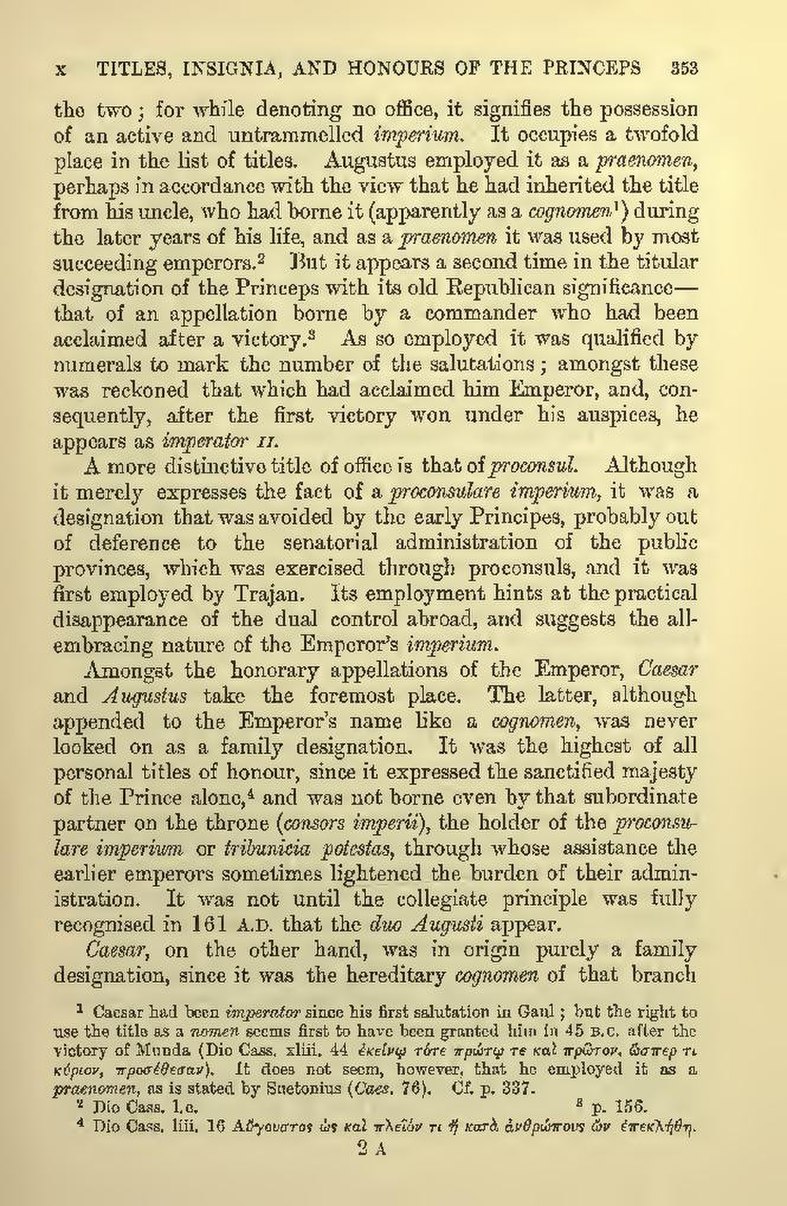the two; for while denoting no office, it signifies the possession of an active and untrammelled imperium. It occupies a twofold place in the list of titles. Augustus employed it as a praenomen, perhaps in accordance with the view that he had inherited the title from his uncle, who had borne it (apparently as a cognomen[1]) during the later years of his life, and as a praenomen it was used by most succeeding emperors.[2] But it appears a second time in the titular designation of the Princeps with its old Republican significance—that of an appellation borne by a commander who had been acclaimed after a victory.[3] As so employed it was qualified by numerals to mark the number of the salutations; amongst these was reckoned that which had acclaimed him Emperor, and, consequently, after the first victory won under his auspices, he appears as imperator II.
A more distinctive title of office is that of proconsul. Although it merely expresses the fact of a proconsulate imperium, it was a designation that was avoided by the early Principes, probably out of deference to the senatorial administration of the public provinces, which was exercised through proconsuls, and it was first employed by Trajan. Its employment hints at the practical disappearance of the dual control abroad, and suggests the all-embracing nature of the Emperor's imperium.
Amongst the honorary appellations of the Emperor, Caesar and Augustus take the foremost place. The latter, although appended to the Emperor's name like a cognomen, was never looked on as a family designation. It was the highest of all personal titles of honour, since it expressed the sanctified majesty of the Prince alone,[4] and was not borne even by that subordinate partner on the throne (consors imperii), the holder of the proconsulate imperium or tribunicia potestas, through whose assistance the earlier emperors sometimes lightened the burden of their administration. It was not until the collegiate principle was fully recognised in 161 A.D. that the duo Augusti appear.
Caesar, on the other hand, was in origin purely a family designation, since it was the hereditary cognomen of that branch). It does not seem, however, that he employed it as a praenomen, as is stated by Suetonius (Caes. 76). Cf. p. 337.].]
- ↑ Caesar had been imperator since his first salutation in Gaul; but the right to use the title as a nomen seems first to have been granted him in 45 B.C. after the victory of Munda (Dio Cass. xliii. 44 [Greek: ekeinô tote prôtô te kai prôton, hôsper ti kurion, prosethesan
- ↑ Dio Cass. l.c.
- ↑ p. 156.
- ↑ Dio Cass. liii. 16 [Greek: Augoustos hôs kai pleion ti ê kata anthrôpous ôn epeklêthê
